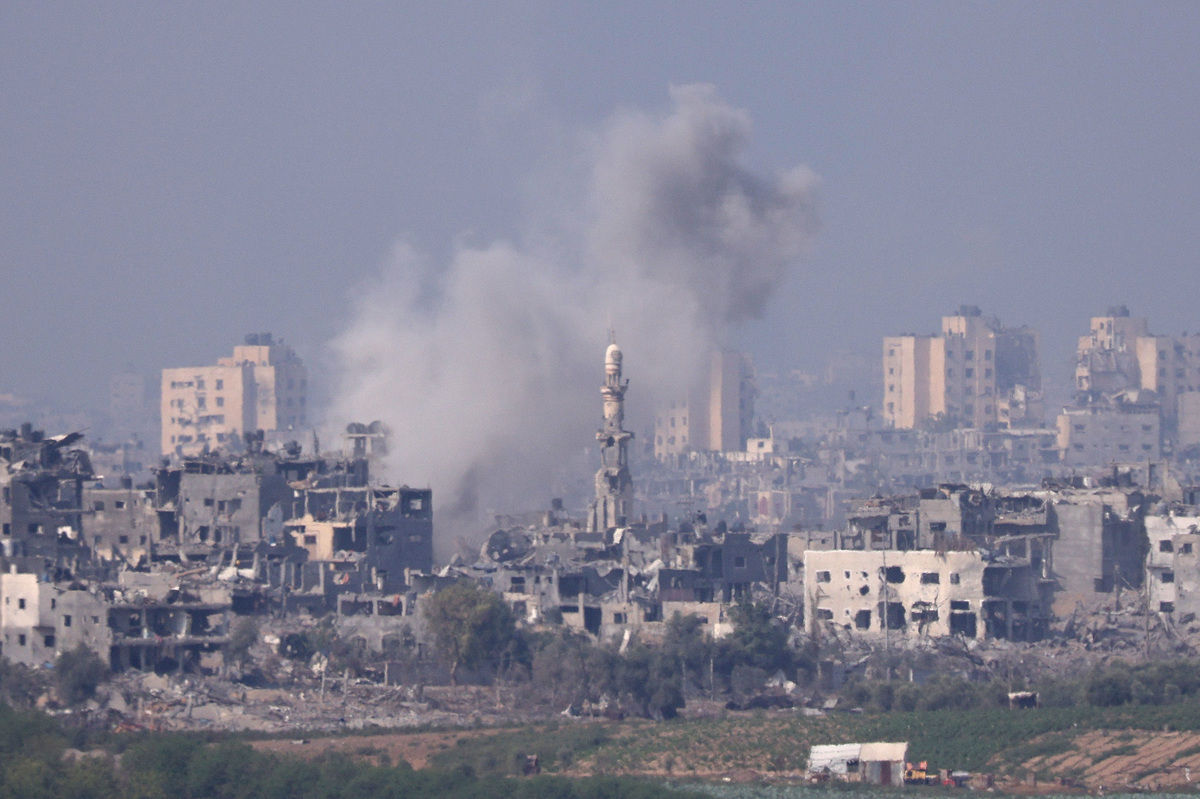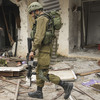
Smoke rises from an explosion in Gaza on Saturday.
Dan Kitwood/Getty Images
hide caption
toggle caption
Dan Kitwood/Getty Images

Smoke rises from an explosion in Gaza on Saturday.
Dan Kitwood/Getty Images
TEL AVIV, Israel — Israeli troops remained on the ground in the Gaza Strip Saturday as part of what military officials have described as an “expansion” of ground operations, marking a significant escalation in Israel’s war with the militant group Hamas that began earlier this month.
For the last several days, the Israel Defense Forces had mounted a series of limited incursions into Gaza, in which soldiers left soon after entering. But Saturday’s announcement was the first extended presence of Israeli troops in the territory.
“Expanding the operation serves all the war’s goals,” said Rear Adm. Daniel Hagari at a press briefing Saturday morning.
Israeli troops entered from northern Gaza, Hagari said, among them ground troops, armor and artillery. Footage released by the Israeli military appeared to show tanks entering along the beach on Gaza’s north end. The ground operation was supported by “very significant, massive attacks from the sea” and heavy air bombardment, Hagari said.

In a statement, Hamas called the operation a “failure” and said Israel took heavy losses. An Israeli military spokesperson said Israel had no casualties in Friday night’s fighting. Neither claim could be independently confirmed.
IDF fighter jets struck 150 underground targets across the northern Gaza Strip, officials said, killing a number of Hamas operatives. Among those killed was Asem Abu Rakaba, the IDF said, describing him as an official who had helped to plan the Oct. 7 attack in which hundreds of Hamas fighters flooded across Gaza’s border and killed more than 1,400 Israeli soldiers and civilians. Abu Rakaba was responsible for the drones and paragliders used by Hamas that day, an IDF statement said.
“Their death and assassination leads to a good advancement in the war’s stages and allows the forces on the ground to battle a weaker enemy,” Hagari added.
The intensifying military operations took place amid a near-total outage of internet and phone service in Gaza, which began around sunset Friday.

Multiple aid groups, including the International Committee of the Red Cross and the World Health Organization, reported difficulty contacting local staff in Gaza.
“We are still out of touch with our staff and health facilities. I’m worried about their safety,” said Dr. Tedros Adhanom Ghebreyesus, director-general of WHO, in a Saturday post on the social media site X, previously known as Twitter.
NPR was also unable to reach local staff in Gaza. The U.N.’s top humanitarian coordinator for the Palestinian territories said they had only been able to reach staff in Gaza via satellite phone.
The intensifying conflict paired with the communications challenges sparked widespread concern about deteriorating conditions in Gaza.

More than 1.4 million people in Gaza are displaced from their homes, the U.N. estimates. Shortages of food, water, fuel and electricity were already severe, aid groups had reported. Hospitals are overrun with patients injured in airstrikes, and at night, their hallways fill with people trying to take shelter from airstrikes.
“Even some of the doctors’ medical staffs, they are saying, what is the benefit of the help that we are doing now? We are not able to help patients anymore. We cannot do anything for them,” said Dr. Mohamad Matar, who spoke to NPR Friday before the blackout.
Fewer than 100 trucks of aid have been allowed into Gaza since the conflict began. Israel said Saturday it would allow more trucks to enter through Gaza’s southern border with Egypt — but warned that the aid would only be available to people in the southern half of the territory.
“Whoever will be in this area, which is a protected area, will receive food, water and medicine,” Hagari said. Israel has repeatedly struck southern Gaza, including the densely populated areas of Khan Younis and Rafah, with airstrikes.

On Friday, health officials in Gaza said that more than 7,300 Palestinians have been killed.
Nearly 230 hostages are still being held in Gaza by Hamas, according to Israeli officials. A group of families of hostages and other missing people demanded a meeting with Israel’s war cabinet for assurances that the operation would not endanger the lives of the hostages.
“This night was the most terrible of all nights. It was a long and sleepless night, against the backdrop of the major IDF operation in the Strip, and absolute uncertainty regarding the fate of the hostages held there, who were also subject to the heavy bombings,” said Liat Bell Sommer, a spokesperson for the group, which is called the Hostages and Missing Persons Families Forum.
Daniel Estrin contributed reporting in Tel Aviv.
